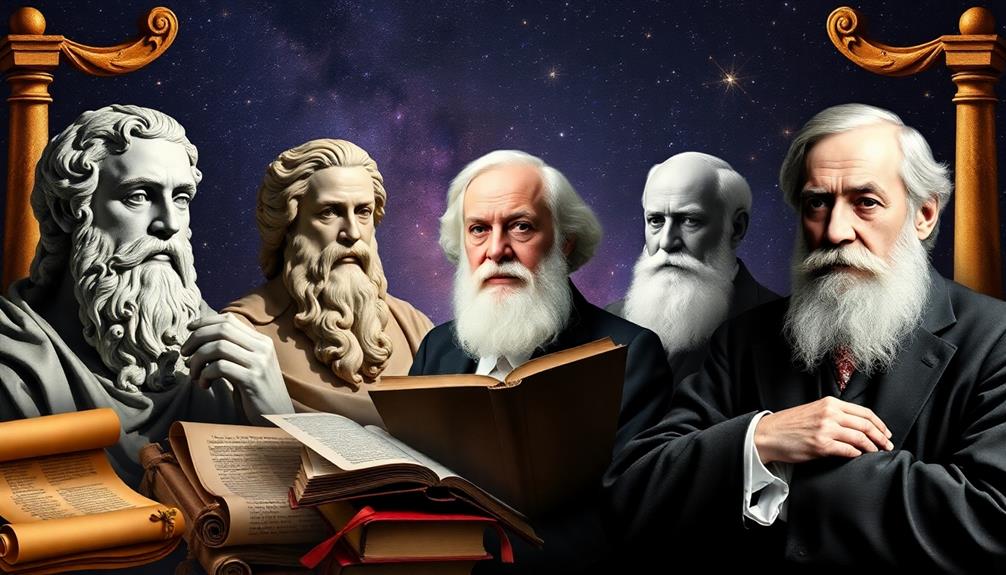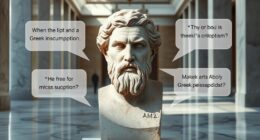Ancient Greece laid the foundation for modern philosophy, ethics, politics, and science. You'll find the Socratic method still enhances critical thinking in education, while Plato's theories shape our discussions on justice and truth. Aristotle's emphasis on virtue and practical wisdom resonates in today's ethical frameworks, guiding personal growth and community involvement. The Greek origins of democracy influence participatory governance and civic engagement. Plus, timeless stories and artistic principles still inspire contemporary culture. Exploring these themes reveals how ancient insights continue to impact your daily life and societal values. There's much more to uncover in this enduring legacy.
Key Takeaways
- The Socratic method fosters critical thinking and self-examination, essential for modern education and ethical discussions.
- Plato's Theory of Forms encourages exploration of abstract concepts, influencing contemporary metaphysics and epistemology.
- Aristotle's emphasis on virtue ethics and practical wisdom remains relevant for personal development and ethical leadership today.
- Ancient Greek democracy laid foundational principles for modern governance, citizen engagement, and civic responsibility.
- Greek contributions to art and science continue to inspire contemporary practices in aesthetics, storytelling, and empirical research methods.
Ancient Greek Philosophy Overview
Ancient Greek philosophy has profoundly shaped our understanding of knowledge, ethics, and existence since its emergence in the 6th century BCE. This era marked the beginning of rational inquiry and dialogue, with philosophers like Socrates, Plato, and Aristotle laying the groundwork for Western philosophy.
You'll find that the Socratic method, a technique of questioning and dialogue, promotes critical thinking and ethical examination, urging you to investigate the depths of your beliefs. Additionally, the emphasis on self-reflection and continuous learning in ancient philosophy parallels modern ideas of personal growth, such as navigating life's tiny pitfalls.
Plato, a student of Socrates, founded the Academy and wrote influential texts, such as "The Republic," where he explores concepts of justice and governance, seeking the ideal state.
Aristotle, Plato's student, expanded on these ideas, making significant contributions to ethics, politics, and various sciences. He's often regarded as the father of empirical observation, emphasizing the importance of observation and classification in understanding the world around you.
The insights from ancient Greek philosophy remain relevant today, influencing contemporary thought and discussions about morality, governance, and education.
Socrates and the Socratic Method
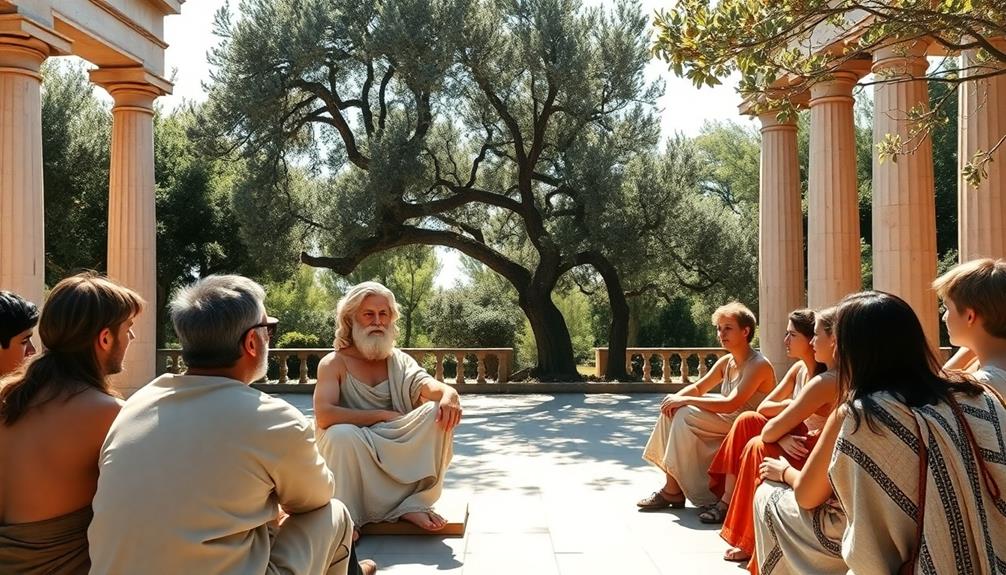
Socrates stands out as a cornerstone of Western philosophy, having pioneered the Socratic Method, which turns the spotlight on critical thinking and self-examination. This method revolves around engaging in dialogue, where you pose a series of questions to stimulate deeper thought and explore your beliefs. By doing so, you often uncover contradictions in your understanding, leading to greater clarity.
In educational contexts, such as through personalized learning approaches, the Socratic Method fosters an environment where students can critically engage with content, enhancing their analytical capabilities.
Through the Socratic Method, you'll find that inquiry isn't just about answering questions; it's about fostering a culture of intellectual rigor. Socrates believed that questioning could help you reach a better understanding of fundamental ethical concepts like justice and virtue.
In modern education, the influence of the Socratic Method is prominent, especially in law schools and critical thinking curricula. Here, it's employed to develop analytical skills that are essential for maneuvering complex issues.
Plato's Theory of Forms
Plato's Theory of Forms suggests that the material world is just a reflection of a higher reality filled with perfect ideals. This notion parallels the creative processes explored in today's artistic endeavors, where creators endeavor to capture the essence of beauty and emotion in their work, reflecting deeper truths of existence the importance of a supportive environment.
You'll find that these Forms, representing concepts like beauty and justice, shape not only his philosophy but also influence modern thought across various disciplines.
Understanding this theory can deepen your insight into how reality and knowledge are interconnected in philosophical discussions today.
Ideal Forms Explained
Many people wonder about the nature of reality and what lies beyond our physical experiences. Plato's Theory of Forms suggests that there exists a domain of ideal, unchanging Forms that embody the true essence of concepts like beauty, justice, and knowledge.
In contrast, the physical world serves as a mere shadow, an imperfect reflection of these Forms. By adopting a mindset focused on abundance and gratitude, as suggested by Abraham's Business Success Principles, individuals can more deeply engage with these philosophical ideas.
Through philosophical reasoning, you can begin to understand these ideal Forms. Plato illustrates this in "The Republic" with the allegory of the cave, where prisoners perceive only shadows. This symbolizes humanity's limited understanding, showing how much more there's to grasp.
Consider these feelings as you explore this theory:
- The frustration of incomplete knowledge
- The yearning for true understanding
- The hope for a just society
- The beauty in pursuing ideals
- The joy of discovering deeper truths
Influence on Modern Philosophy
Numerous modern philosophers have built upon the foundations laid by Plato's Theory of Forms, exploring its implications in metaphysics and epistemology. This theory, articulated in "The Republic," asserts that non-material abstract forms represent the most accurate reality, distinguishing between the physical world and a higher domain of perfect forms.
Plato's insights into the nature of existence resonate profoundly in today's discussions about existential themes, as they challenge conventional views on self-identity and meaning. Your understanding of Plato's ideas reveals how they've considerably shaped contemporary philosophical movements, including Neoplatonism and idealism.
Plato's emphasis on the existence of these ideal forms raises essential questions about the nature of reality. For instance, how do we perceive abstract concepts like justice, beauty, and goodness? These inquiries remain central in discussions about ethics and aesthetics today.
By positing that ideas can exist independently of their physical manifestations, Plato invites you to reflect on the deeper meanings behind everyday experiences.
The influence of the Theory of Forms endures, prompting debates about whether these perfect forms truly exist or if they're merely constructs of the human mind. As you engage with these philosophical discussions, you'll find that the legacy of Ancient Greece continues to resonate, encouraging critical examination of reality, perception, and the nature of existence itself.
Aristotle's Ethical Framework
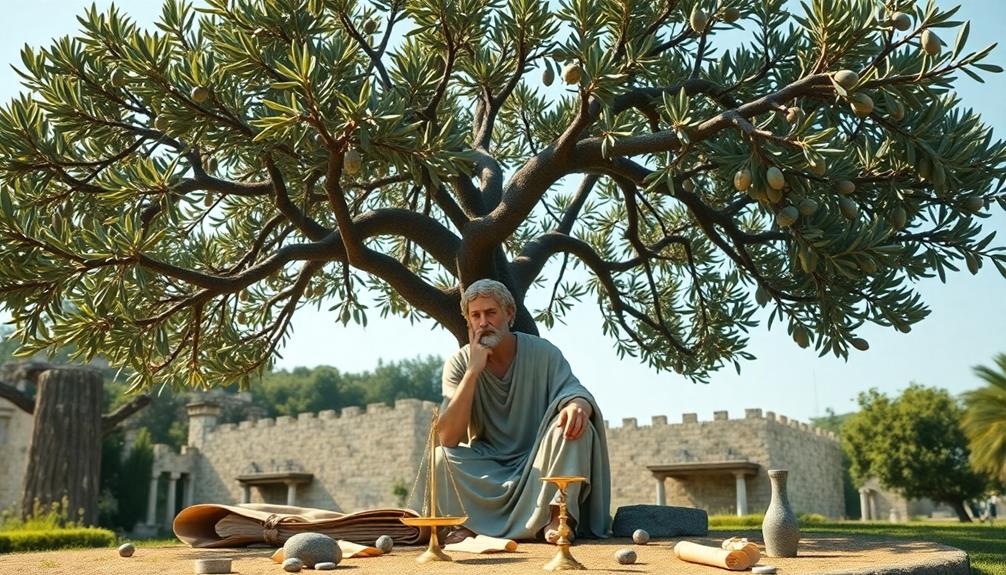
Aristotle's ethical framework invites you to focus on developing good character traits, which he believes are essential for achieving eudaimonia, or true human flourishing.
By nurturing these traits, individuals can create a life filled with meaningful connections and emotional depth, much like the heartfelt expressions of love that celebrate bonds between family members.
He emphasizes the importance of practical wisdom, or phronesis, in managing life's challenges and finding the right balance in your actions.
Virtue and Moral Character
Embracing the concept of virtue as a mean between extremes, Aristotle's ethical framework provides a profound understanding of moral character. He emphasizes that developing virtue isn't just a one-time event; it's a habitual practice that leads you toward eudaimonia, or human flourishing.
This journey involves both moral virtues, which shape your character and emotions, and intellectual virtues that enhance your reasoning. Practicing mindfulness can further deepen this journey, as it allows for greater self-awareness and reflection on one's actions, fostering a sense of mental clarity and health.
To truly grasp this framework, consider how it connects to your life:
- You find joy in meaningful friendships.
- You seek balance, avoiding extremes in your actions.
- You endeavor for rationality in your decision-making.
- You cultivate a sense of community that supports your growth.
- You recognize that happiness stems from virtuous living.
Aristotle argues the ultimate goal of life is happiness, achieved through living virtuously. This requires not only self-awareness but also understanding the importance of community and friendship in nurturing moral character.
His insights remind us that our ethical decisions unfold within a social context, reinforcing the value of practical wisdom. By embracing these principles, you can cultivate a more profound sense of purpose and fulfillment in your life.
Practical Wisdom (Phronesis)
While maneuvering through the complexities of everyday life, practical wisdom, or phronesis, plays an essential role in helping you make sound decisions. Aristotle defined phronesis as the virtue that enables ethical behavior and moral judgment, emphasizing its importance in navigating real-world situations.
Unlike theoretical wisdom, which focuses on abstract concepts, practical wisdom is grounded in action and experience. It's about knowing what's good and applying that knowledge effectively in various contexts. In today's fast-paced digital world, where technical challenges abound, fixing technical SEO errors can also reflect practical wisdom in decision-making by prioritizing actions that improve overall site performance.
Aristotle believed that practical wisdom could be cultivated through experiences and moral education, making it vital for both leaders and citizens aiming for a well-lived life, or eudaimonia. By integrating emotions with rational thought, phronesis equips you to respond thoughtfully to complex dilemmas.
In today's world, the modern relevance of Aristotle's framework is clear. As you face ethical challenges, the principles of practical wisdom guide your decision-making, helping you balance competing interests and values.
The philosophical legacy of Aristotle encourages you to reflect on your choices, enhancing your ability to lead a fulfilling and virtuous life. Embracing practical wisdom can greatly impact your ability to contribute positively to society.
Eudaimonia and Human Flourishing
How can you truly measure a life well-lived? Aristotle's concept of eudaimonia, or human flourishing, offers a profound answer. He argues that fulfillment comes from practicing virtue and finding a balance, known as the Golden Mean, between excess and deficiency.
By embracing rationality and nurturing moral virtues, you can pursue a deeper happiness that transcends mere pleasure or material gain. Additionally, engaging in practices that promote emotional well-being, such as aromatherapy for anxiety relief, can further enhance your journey towards fulfillment.
To achieve eudaimonia, consider these essential aspects of your journey:
- Cultivating meaningful relationships that enrich your life.
- Engaging in lifelong practices that challenge and grow your character.
- Seeking knowledge and wisdom that elevate your intellect.
- Committing to your values and principles for moral integrity.
- Reflecting on your actions to align them with your true self.
Eudaimonia isn't a destination but a continuous quest for balance and purpose. This framework resonates in today's discussions of positive psychology, reminding you that a fulfilling life is attainable through intentional choices.
As you navigate this path, remember that your journey toward human flourishing isn't just about reaching happiness, but about embodying the virtues that sustain it.
Democracy's Origins in Greece
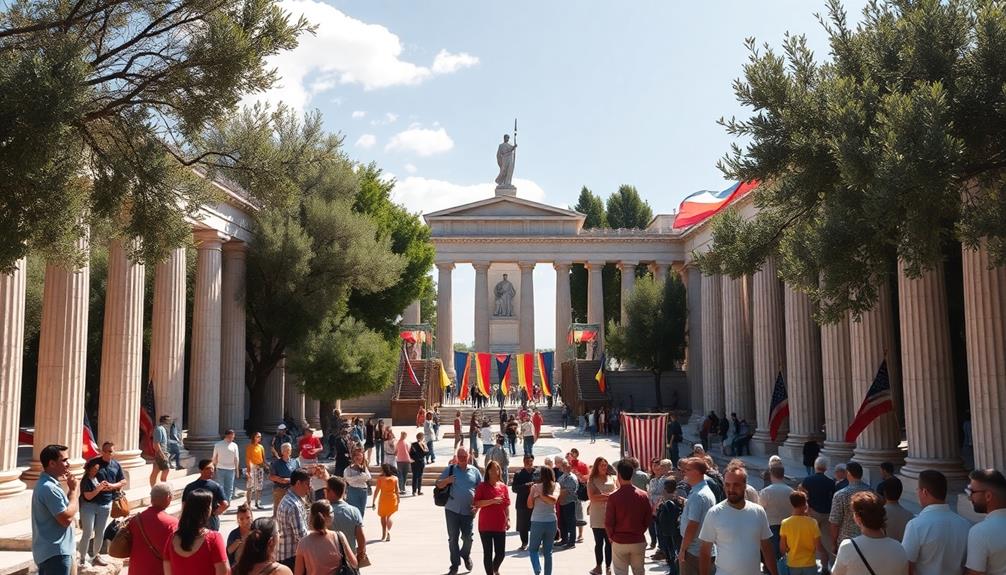
Ancient Greece's revolutionary approach to governance laid the foundation for democracy as we perceive it today. In Athens, the birthplace of democracy, citizens actively participated in decision-making through assemblies. The term "democracy" itself comes from the Greek words "demos" (people) and "kratos" (power), emphasizing popular sovereignty.
Key reforms by leaders like Solon and Cleisthenes established fundamental principles of citizenship, civic duty, and accountability. These reforms encouraged equal participation, serving as a model for contemporary governance structures.
| Key Concepts | Description |
|---|---|
| Citizenship | Defined who could participate in governance |
| Civic Duty | Emphasized responsibility towards the community |
| Public Debate | Allowed open discussions on policies |
Ancient Greek democracy enabled public debate and voting, fostering an environment where accountability was essential. These elements resonate in modern democratic systems, where citizen engagement and the rule of law remain significant. The legacy of Ancient Greece continues to shape our perception of democracy, reminding us of the importance of active participation in governance.
Artistic Contributions and Influence
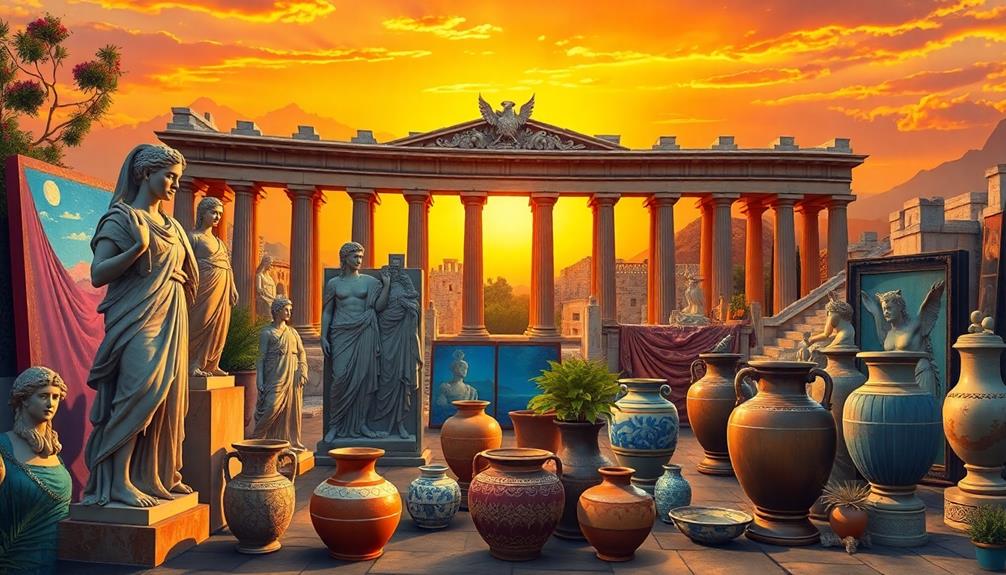
The artistic legacy of Greece is as profound as its political innovations, showcasing a remarkable blend of realism and idealism that set the stage for future artistic endeavors.
Ancient Greek art laid the foundation for sculpture, with iconic works like the Discobolus influencing how we represent the human form. The Parthenon exemplifies architectural brilliance, using the golden ratio to achieve perfect balance and proportion, inspiring neoclassical designs worldwide. This pursuit of balance and harmony is also reflected in culinary traditions, where dishes like Easy Tomato Focaccia embody a similar appreciation for simplicity and flavor.
Greek theater, through playwrights like Sophocles and Euripides, pioneered tragedy and comedy, shaping modern storytelling. The intricate narratives on Greek pottery offer a glimpse into their culture, resonating through time.
- Feel the awe of the Parthenon's grandeur.
- Experience the raw emotion of a Greek tragedy.
- Marvel at the intricate beauty of ancient pottery.
- Appreciate the balance and proportion in every sculpture.
- Recognize how these contributions continue to influence art today.
These artistic contributions have profoundly impacted the Renaissance and remain essential in contemporary design and architecture.
The principles of balance, proportion, and harmony found in ancient Greek art continue to inspire, reminding us of the timeless nature of their influence.
Scientific Advancements and Legacy

Throughout history, Greek scientists and mathematicians have profoundly shaped our understanding of the natural world. Their contributions set the stage for many foundational principles we still rely on today. The scientific method, emphasizing empirical observations and rational inquiry, traces back to the systematic approaches of ancient Greeks. Figures like Pythagoras and Archimedes laid the groundwork for modern mathematics and physics, exemplified by the Pythagorean theorem and laws of buoyancy.
In medicine, Hippocrates established ethical standards through the Hippocratic Corpus, which continues to influence medical ethics today. In astronomy, Aristarchus and Hipparchus advanced heliocentric theories and created early star catalogues, paving the way for future discoveries.
Here's a quick overview of some key contributions:
| Field | Contribution | Key Figure |
|---|---|---|
| Mathematics | Pythagorean theorem | Pythagoras |
| Physics | Laws of buoyancy | Archimedes |
| Medicine | Ethical standards | Hippocrates |
| Astronomy | Heliocentric theories | Aristarchus |
| Biology | Biological classification | Aristotle |
These advancements not only showcase the brilliance of the ancient Greeks but also continue to impact our lives today.
Greek Literature and Storytelling

Greek literature has left an indelible mark on storytelling, shaping narratives that resonate with audiences even today. Epic poems like Homer's *Iliad* and *Odyssey* introduced themes of heroism, adventure, and moral conflict that continue to inspire modern storytelling.
The ancient Greeks laid the groundwork for drama through tragedy and comedy, with playwrights like Sophocles and Euripides delving into complex human emotions and ethical dilemmas. Their works not only entertain but also provoke thought, ensuring their timeless relevance.
- Feel the weight of moral choices.
- Experience the thrill of epic adventures.
- Witness the depth of human emotion.
- Engage with timeless myths that shape our understanding.
- Discover the art of critical thinking through philosophical dialogues.
Greek mythology serves as a rich tapestry of gods and heroes, informing modern literature and popular culture.
The philosophical dialogues of Plato encourage critical thinking and literary analysis, impacting how literature is studied today. By embracing these ancient narratives and themes, you connect with a lineage of storytelling that's both profound and enduring, illustrating the lasting influence of Greek literature on our shared human experience.
Cultural Impact on Modern Society
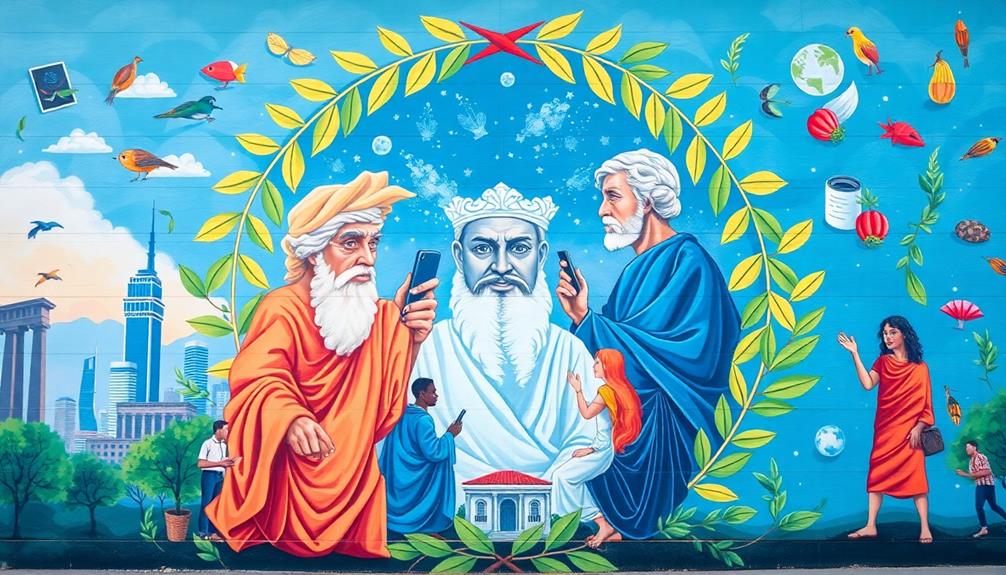
Amidst the echoes of ancient thought, the cultural impact of Greek philosophy resonates powerfully in modern society. The philosophical inquiries of Socrates, especially his focus on critical questioning and ethics, shape educational practices today, fostering critical thinking skills in students.
You'll find Plato's theory of Forms and his exploration of justice in "The Republic" continue to serve as a foundation for contemporary discussions on morality and governance.
Aristotle's systematic approach to various fields, including ethics and politics, informs modern disciplines like psychology and political theory, making his insights invaluable. You might also notice the Socratic method, which promotes dialogue and debate, widely used in law schools to develop analytical skills and encourage inquiry.
Moreover, Greek mythology, rich in moral lessons, still inspires modern literature, art, and pop culture, illustrating how ancient narratives shape contemporary values.
These philosophical legacies remind you that the ethical frameworks and governance principles we rely on today owe much to the thinkers of ancient Greece, ensuring their relevance endures in our ever-evolving society.
Lasting Philosophical Questions

The legacy of ancient philosophy stirs up lasting questions that challenge our understanding of existence and morality. You might find yourself grappling with issues that philosophers like Socrates, Plato, and Aristotle explored centuries ago. These enduring inquiries still resonate today, shaping our perspectives on justice, individual rights, and civic responsibility.
- What's the true nature of justice?
- How can we balance individual rights with the needs of democracy?
- Are our ethical frameworks sufficient for modern dilemmas?
- How do we define a good life?
- What role does the scientific method play in ethical discussions?
The Socratic Method encourages you to engage in critical thinking through structured dialogue, pushing you to question your assumptions.
Plato's "Republic" invites you to ponder the essence of justice and governance, while Aristotle's empirical approach laid the groundwork for the scientific method, emphasizing evidence in philosophical inquiries.
These questions not only reflect ancient wisdom but also demand your active participation in shaping a just society. By wrestling with these themes, you become part of an ongoing dialogue that spans generations, enriching your understanding of morality and existence.
Frequently Asked Questions
How Does Ancient Greek Philosophy Influence Us Today?
Ancient Greek philosophy influences you daily through critical thinking, ethical frameworks, and the foundations of political theory. You engage with Socratic questioning, grapple with concepts of justice, and apply empirical methods in scientific inquiry.
What Is a Legacy From Ancient Greece That We Still Have Today?
You might think ancient Greece is too distant to matter today, but its legacy, especially in democracy, shapes your civic engagement and responsibility. Understanding this connection empowers you to participate actively in modern governance.
Is Greek Philosophy Still Relevant?
Yes, Greek philosophy's still relevant. You engage in critical thinking through the Socratic Method, explore ethics influenced by Aristotle, and navigate democratic ideals rooted in ancient discussions, shaping your understanding of knowledge, morality, and governance.
Why Is Ancient Greek Still Relevant Today?
Ancient Greek thought's relevance today lies in its foundational principles that shape ethics, governance, and critical thinking. You'll find these ideas influencing modern debates in law, politics, and education, making them essential for understanding contemporary society.
Conclusion
In the grand tapestry of human thought, ancient Greek philosophy weaves vibrant threads that still color our lives today. From Socrates' probing questions to Aristotle's ethical guides, these ideas shape how we think, govern, and relate to one another. As we navigate the complexities of modern life, the wisdom of Greece serves as a compass, steering us toward deeper understanding and connection. Embrace this legacy; it's a treasure chest of insights waiting to enrich your journey.




